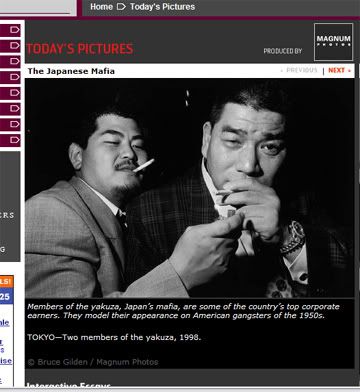
The yakuza has been around for a long time. No matter how orderly your culture, there are certain vices that its members want to indulge in, vices that may not be legal but- all moral judgements aside- are frequently necessary outlets for negative energy and stress relief.
If you want to see photos of Japan's home grown, tattooed organized crime organization, you should visit Slate. They have an interactive slide show with some fascinating pictures of this ubiqitous yet little-discussed part of modern Japanese life.
I've only had 2 encounters with the yakuza. It's probably better as a foreigner in Japan to have as few as possible.
I'll tell you about the first time, which was one night when my friend M and I were walking around downtown Hamamatsu after having dinner together. We were talking about things in general, wandering aimlessly as we talked.
At one point, we went down this dimly-lit narrow sidestreet behind the Zaza City shopping complex. This particular street is lined with small bars, many of which have serious-looking men in dark suits standing out front during business hours. And as we walked, that's pretty much what we saw.
M whispered to me, "This is yakuza street..."
"Don't worry," I reassured her. "If they start anything, I'll pick you up and run."
The second time was New Year's Day, 2005, in Kabuki-cho, Tokyo. Let's not talk about that one.
According to the online site The Crime Library, some sources say their origins are found in the 1600s, with kabuki-mono (crazy ones), samurai who dressed in wild costumes. The yakuza themselves claim they're the descendants of the machi-yokko (town servants) who protected villages from corrupt government officials in a sort of Robin Hood fashion. I suppose in this way, they're somewhat similar to the Mafia in its early Sicilian history.
The downtrodden, the outcast; they band together and ward off the depradations of official justice. That's the mythical view, anyway. In reality, they prey on the very people they claim to protect.
Whatever their origin, in modern Japan, the yakuza control gambling, prostitution and the ever-available pachinko parlor trade, plus loan sharking and all the stuff you'd expect organized criminals to be involved with. There's an unspoken agreement between the police and the yakuza, and one reason there's not a lot of street crime in Japan is it's not profitable to stir the waters.
The Crime Library pegs their number at roughly 110,000, organized into 2,500 families. The site contrasts this with the US, where with double Japan's population, there are only around 20,000 members involved organized crime, even with the Mafia factored in.
They also have connections to Japan's right wing politicians, often funding the loudspeaker vans that drive around blaring political slogans during election times here. In this role, the yakuza see themselves as protectors of all the traditional Japanese values and mores.
One of the showier events in yakuza history took place in 1992. As colorful criminals, the yakuza are popular action film fodder. Many of these movies give romanticized versions of yakuza life, in the same vein as The Godfather films, or feature hardcore violence and mayhem.
Filmmaker Itami Juzo, director of the internationally acclaimed comedy Marusa no Onna (A Taxing Woman, about a persistent tax collector), made a movie called Minbo no Onna (Anti-Extortion Woman). This film was a different take on the yakuza, one that wasn't so flattering. In it, a woman does battle with ridiculous gangsters, besting them not with violence but with her wits.
Evidently, the real life criminals didn't take to being depicted as comical buffoons, and waited outside Itami's home. They slashed his face and neck, landing him in the hospital. He survived the attack only to commit suicide in 1997 after being accused by the press of infidelity.
His final film, 1997's Marutai No Onna, features another female protagonist, this time a middle-aged actress who witnesses a murder by a shady cult and has to enter police protection. Actually... it's a comedy, albeit one that explores some of the dark themes that haunted Itami after the assault.
You can read more about the yakuza in the on the Crime Library site.
No comments:
Post a Comment